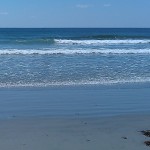Santana
Meeting a Sandcastle at High Tide
It was a warm summer afternoon in a small town in southern New Hampshire, back in the summer of ’79, and it had finally arrived. Summer vacation had just begun, and for this group of friends gathered around the family pool, the air was ripe with the kind of optimism and mystery that only a teenager can have – you know, that “anything can happen” feeling that occupies the youthful soul. Staring at the pool in cheerful content, they basked in the warmth of the sun while listening to the “Woodstock” soundtrack booming out a bedroom window. The youngest in this pack, a  couple of eleven year old boys who were a few months away from starting junior high, seemed more than intrigued by some of these “new” electric sounds permeating this virgin summer air.
couple of eleven year old boys who were a few months away from starting junior high, seemed more than intrigued by some of these “new” electric sounds permeating this virgin summer air.
“What’s the name of this band?” asked one of the youths.
“That’s ‘Sly and the Family Stone”, answered Dave, the boyfriend of one of the younger lads’ older sisters.
“Wow, this is really cool!” the excited boy answered.
Up until this moment, these youngsters, like most pre-teens from this era, had been mostly hearing the corporate radio music of the day – a post-disco fallout period with bands and artists like E.L.O., Michael Jackson, and The Eagles providing a daily dose of saccharine for the masses – “Don’t bring me down…..Brrrruuucccce!”
“If you like Sly, you’re really going to love the last side of this record!” he confidently announced, and a short while later, everything changed.
It was as if a bomb had gone off – suddenly, the music coming out of the speakers sounded more like a science fiction movie soundtrack than it did the groovy “freedom rock” that had played just minutes before. Sounds that seemed to begin as single guitar notes ended as explosions – harmonic cascades and otherworldly sounds swirling into the stratosphere – “sheets of sound”. This music spoke of the epic joys and tragedies of the human struggle – war, hunger, love, peace, poverty, anarchy, inequality – it was all there, yet not a single lyric had been sung.
Near speechless, one of the 11 year olds turned to his friend and managed to say “this is amazing!”
“I thought you might like this” was the response, and they continued to marvel in the sonic wonderment, this new discovery rendering a near out of body experience.
With each passing moment came a new level of heightened awareness for the one boy in particular. It wasn’t as if he had never heard great music; many years before, his dad had turned him on to Santana, John Lee Hooker, and many other  greats from the golden era of blues and rock. But this was different. This music transcended all of the traditional music forms that he had heard before. Melodically, it was free from the constraints of the pop song, or even blues format, yet it was bluesy. Rhythmically, it seemed connected to the earth in an intangible way, kind of tribal, with roots going deep into the African jungle. It was as if these sounds came right out of the sky, from the heavens, not a speaker in a window.
greats from the golden era of blues and rock. But this was different. This music transcended all of the traditional music forms that he had heard before. Melodically, it was free from the constraints of the pop song, or even blues format, yet it was bluesy. Rhythmically, it seemed connected to the earth in an intangible way, kind of tribal, with roots going deep into the African jungle. It was as if these sounds came right out of the sky, from the heavens, not a speaker in a window.
This music “spoke” to the young boy with a clarity he had not yet experienced in life, rendering this otherwise insignificant summer day the birth of the universe for him. It felt like a calling, like this was the day his life really began, the birth of an endless pursuit to the new sense of self and spirituality that permeated his being on that warm day in the sun long ago – like ocean waves meeting a sandcastle at high tide.
That was the day I first heard the music of Jimi Hendrix.
